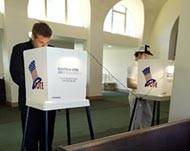A nation split down a religious fault line
After months of intense media speculation about the political ramifications of the war in Iraq and the tepid US economy, the post-presidential election debate has been unexpectedly dominated by two words: moral values.

For 22% of the American electorate, moral values were the decisive factor in the campaign, more than any other single issue, according to an exit poll conducted by CNN.
Roughly four-fifths of these voters supported the re-election of President George Bush.
Political analysts have focused a great deal of attention on Bush’s overwhelming support among religious voters, particularly evangelical Christians for whom social issues such as opposition to gay marriage, abortion and stem cell research were political lightning rods.
The ideological chasm between Democrats and Republicans, largely centred on a geographic pattern of liberal “blue states” and conservative “red states,” has gradually developed into a religious divide split down cultural lines, according to Luis Lugo, president of the Pew Center on Religion and Public Life.
“I think the political fault line is reflected in a religious fault line,” he said.
Solid majority
Polling data showed that a solid majority of Americans who attend church services at least once a week voted for Bush. With the exception of black voters, who traditionally vote Democrat, Senator John Kerry was unable to capture widespread support among regular church-goers.
 |
|
Bush’s focus on religious values |
On the flipside, Kerry won a close victory among infrequent church attendees and did far better than Bush with secular voters, according to an Associated Press poll.
Bush dominated the Protestant vote and even managed to win more Catholics, despite Kerry’s Catholic background.
Voter turnout, which proved to be a greater plus on the Republican side, was galvanised by the president’s unrelenting focus on religious rhetoric and cultural values deemed important to conservative voters, several experts said.
Faith-based message
“I do think that religion played a very large role [in voter turnout],” Barbara Hagerty, the religion correspondent for National Public Radio, said.
|
“Christian voters turned from one party to another on the basis of what they perceived to be these cutting-edge moral issues” Luis Lugo, |
Hagerty was speaking at a recent forum on the role of religion in the presidential election sponsored by The Interfaith Alliance.
Conventional wisdom suggests the Bush team was extremely effective in utilising a faith-based message to engage Christian conservatives, something Kerry was never able to accomplish with liberal and moderate religious voters.
“The entire Republican get-out-the-vote effort was a religious outreach effort,” Steven Waldman, editor-in-chief of BeliefNet, an online, interfaith organisation devoted to religious dialogue, said.
That effort centred on a strategy to emphasise culturally divisive issues such as gay marriage and stem-cell research, which most conservative Christians opposed.
Religion factor
Karl Rove, the president’s chief political strategist, believed there were as many as four million evangelical Christian voters who did not vote in 2000 who could be won over this election.
“Rove hit his four million [new evangelical voters] and then some,” Waldman said.
 |
|
Kerry failed to grab widespread |
While some political analysts say it is still too early to reach any definitive conclusions about the religion factor, the impact of the Christian right on Bush’s re-election is undeniable.
Speculation now centres on the amount of political influence that constituency will have over the next four years.
Welton Gaddy, president of The Interfaith Alliance, said many in the religious right view Bush’s victory as a “religious revolution” and a “contemporary revelation of a divine will”.
Furthermore, Hagerty said, there is a possibility that Bush’s religious base will attempt to “impose a social agenda”, something that could “create division” in the country beyond the political fissures that already exist.
Ambivalent ties
Whether Democrats will be able to counter that influence by enhancing their own message to religious voters is unclear, but Kerry had a difficult time injecting faith-based language into his campaign. Such political reticence has been a common problem for religious Democrats in the past.
|
“The entire Republican get-out-the-vote effort was a religious Steven Waldman, |
“The religious left has been god awful with [public relations],” Amy Sullivan, an expert on religion and politics at The Washington Monthly, said.
Some believe Democratic candidates have struggled to reconcile the diversity of religious and secular attitudes that pervade the liberal wing of American politics.
“The Democrats have such an ambivalent relationship with faith because they have such a large tent,” Hagerty said.
Yet there are plenty of liberal voters who take religion into the voting booth.
“It is not true that the only people who vote based on their religion are conservatives,” Sullivan said.
Shift in support
None the less, the Republican advantage in faith-based politics is rooted in a battle over cultural issues that began several decades ago, many scholars say.
 |
|
Fighting in Iraq turned out to be |
Since the 1960s, court decisions on such divisive issues as school prayer and abortion have contributed to a shift in support among religious voters to the Republican side.
As an increasing number of Christian voters grew alienated by cultural developments that clashed with their religious faith, Lugo said.
“They turned from one party to another on the basis of what they perceived to be these cutting-edge moral issues,” he said.
For the Democrats to become more competitive in the arena of religion and politics, they will have to overcome an advantage built up over a long period of time by the Republican Party.
“Christian conservatives and the Republican Party have a 30-year head start on the religious left,” Sullivan said.